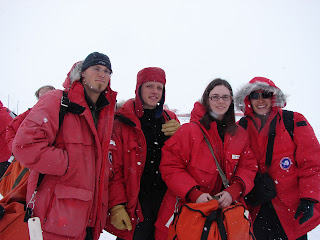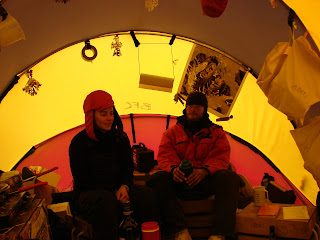A typical day in the field starts at around 8a. In the beginning of the season, I would wake up with frost on my face and the dread of unzipping myself from my warm down sleeping bag and fleece liner. But towards the end of the season, the temperature got closer to -5 C, and getting out of bed wasn’t as terrible. Generally, one person in the group would be responsible for calling into Mac Ops (McMurdo Operations Center) as a check-in, letting them know that everyone at the field camp was safe and sound. Then, we’d all settle in for a delicious breakfast – either hoo-hash (last night’s left overs) or a delicious bowl of oatmeal and granola. This was actually perhaps the best meal of each day (for me at least). And then, we’d fill up our water bottles, slather on some sunscreen, put on a few layers and our sunglasses, and get ready for a day out in the field. Typically, we’d work in pairs – I was usually with Jen. I spent most of my time in the field, supporting the research of both Jen and Sean because we weren’t actually drilling ice cores this year. But I was able to take some time towards the end of the season to dig some pits and collect some ice chips for my own lab analysis. (see The Science for more info).

Here's the inside of the Scott tent that Jen and I shared. Nice and cozy. We were given pretty comprehensive sleep kits that contained a cot, 2 sleeping pads, a down sleeping bag, and fleece liner. On cold nights, we'd also set up a white gas stove to heat up the tent a little bit, which inside the canvas tent, was really quite toasty.
Getting ready for a day in the field. That's Jen packing up her pack.
Most of the field work was conducted anywhere from just a few meters to several kilometers away from our base camp, so I had a lot of time to practice walking in bunny boots over the rocks in Mullins Valley. The work itself was pretty straightforward. Often times you would be doing some pretty mindless tasks, like counting rocks, collecting rock flakes, or moving rocks, so there was a lot of time to just think. I’ve done a lot of field work before, and I’ve always really enjoyed the peace and time to just let your body work and your mind wander. When you’re in the office, classroom, or lab, back in ‘real life,’ you never really feel like you have that time to just think about important things or not important things. In some ways, it’s rejuvenating to just do simple tasks, grounding yourself in more ways than you’d think.
A happy moment in the field.
Often times, we would work a bit too far from camp, so coming back to the Cook Tent would be just a waste of time. So, we’d pack snacks with us, like Bumper Bars (pretty much bars of butter with pieces of fruit in it), Cliff bars, gorp (bags of nuts, chocolate, and dried fruit), and other high calorie goodies. In the beginning of the season, all of these snacks would be pretty much frozen, which was a pain to eat, but you do your best. You might wonder why all the food we eat seems to be so high in energy, fat, and protein – well, not only are we very active out in the field, but we are also burning a lot of energy just because it’s so cold out here. Our bodies are typically around 37 C or 98.6 F, and the average temperature in Mullins is -10 C or 14 F, so to maintain that normal body temperature, we’re constantly burning energy and fat stored in our bodies. While out in the field, I developed a pretty healthy appetite – when you’re cold, you automatically eat more. But now that I’m back in McMurdo (typical temperature right now -3 C or 26.6 F), I’m not burning as many calories to stay warm, so I’ve had to start limiting what I eat a bit more now. Unfortunately, it’s been hard, especially when the food here is so good (and not expired)! I guess I should explain: a lot of the food we had in the field we noticed was expired. Some of the worst items: Mild Cheddar cheese (expired February 2008), Nature Valley bars (made in 2002), canned soups (expired July 2009), Cadbury chocolate (expired November 2009), and many many others. Some of the food doesn’t sound like it’s so terribly out of date, but when you think that these foods were made to be packaged for a long time (like canned foods), you get a little worried. What’s also interesting, is that you really lose any sense of ‘dirty food.’ Typically most people think even a ten-second rule (picking up and eating food that fell on the floor for less than ten seconds) is pushing it, but I ate some food off the floor that had been there for over 3 hours – we coined that the 3-hour rule. Well, we survived, so I guess it wasn’t terrible.

The end of one of the longer days in the field. I literally pulled my pack off and collapsed in front of my tent. It was probably the most comfortable position I've ever been in, and I didn't even know I was lying on a rock.
Typically during the day, we would carry our packs with us, bringing more sunscreen, chapstick, a full water bottle (it’s easy to get dehydrated out here – it is the Dry Valleys, emphasis on dry), an empty pee bottle (don’t want to contaminate an otherwise pretty pristine environment), some snacks, a camera, a radio (for communication between groups), and any scientific equipment we would need for the day. I would also bring a plastic bag with me and some toilet paper, just in case I would have to do a number 2 in the field (which happened many times, much to my chagrin). What’s interesting is that after being out in the field for a while, you start to just live with things. The expired food is one example. Another is not washing your hands. Another is getting used to a steady stream of snot dripping from your nose – it was actually a little ridiculous sometimes. It would get a bit difficult, especially when you’re trying to take notes in your field notebook, when all of a sudden a huge splash of snot lands where you’re trying to write and your pencil can’t write on the wet patch anymore….sigh). And another is getting used to drinking pretty dirty water. You might wonder how we get drinking water out in the field. So, we don’t melt the glacial ice, but we do melt snow for water. There are patches of snow that are relatively permanent fixtures on the landscape due to local topography (land forms). Generally, this snow contains bits of rock debris, which, compounded with the accumulated dirt and dust in your water bottle from 4 weeks of refilling your water bottle, is pretty gross. By the end of the season, I was doing my best to filter my water with my teeth before swallowing. But sometimes, you just have to close your eyes and say, ‘bottoms up.’

ANTARCTICA!! That's something we would occasionally yell in the field - just for good measure.
At the end of the day, we’d all head back to the tent, and whoever was back first would generally start cooking dinner (usually anytime between 5p and 8p). A lot of thought goes into the planning of food for 4 weeks. Before we head out to the field, meals are all planned out in advance. We prepare typically one rock box (wooden box) for each week we’ll be out there. In each rock box we have a series of meals that we cycle through: mac and cheese, mashed potatoes, pasta, stir fry, chili, and burrito nights. By the end of the season, we had a lot of random leftover food, so we started experimenting and mixing up our meals. One night, I made peanut butter noodles (that was a hit). Another night, Greg made pizza (which was also delicious). It was actually a lot of fun cooking in the field (when the stoves weren’t acting up).
The mess after dinner. The two stoves were run on propane, which was really great because it was so easy.
Post-dinner activities.
After stuffing ourselves, we’d usually sit back and talk, read, work on some science, or just stare off into space. And then we’d talk about our plans for the next day, and retire to our Scott tents. I’d usually read a little or write in my journal before getting ready for bed. It was always really nice to get ready for bed. Taking off my bunny boots was always amazing, and then my wool socks – also amazing. What’s funny is that sometimes my feet would steam after I'd take off my shoes and socks. Unfortunately, the bunny boots are rubber, non breathable shoes, so all the sweat tends to pool in them and get soaked up into the socks, which is why my feet would steam at night. It was a bit strange at first, but eventually I would get excited to see if my feet would steam or not that night. And then after brushing my teeth and hair, I’d crawl into my sleeping bag and fleece liner, zip up, and burrow deep. I’m fortunate in that I’m a deep sleeper, so I didn’t often wake up in the night, unless it was really cold. I think I got some of the best sleep out in the field that I’ve had in a while, actually.

All tucked in! Two essentials to go to sleep with: a sleeping hat (keeps you nice and warm) and an eye-shade (keeps the 24 hour sunlight from letting you get a good night's sleep).
Hanging up my steaming socks to dry.
Night-night Jen!
The next morning, we’d start all over again. We didn’t take any days off except for Christmas, which actually wasn’t terrible. Somehow, the days started going really quickly, and I lost track of the days of the week at some point. But Christmas day was nice – we slept in (didn’t open any presents, though), ate lots of food (had some expired eggnog and ham), read a little, talked a lot, and overall had a good day off. Greg decorated the Cook tent with snowflakes, and we each called our families using the Iridium satellite phone we had. We also played a lot of Christmas songs – Greg and Jen both brought their ipods, which was nice. It was an amazing Christmas (Antarctica!! Woot woot!), but also a little lonely (you think of family and friends during the holidays, usually).
Yay! Snowflakes!
A penguin! Unfortunately, we don't see real penguins where we are because we're high up in the TransAntarctic mountains and penguins are typically coastal animals.
Jen using the Iridium satellite phone to call family.
A happy moment in the tent.
Overall, life in the field was surprisingly civilized. Once you adjust to it, there’s a lot about the simplicity of living in the field that you really start to enjoy.
Waking up to a beautiful morning. This is the view from my tent.





















































